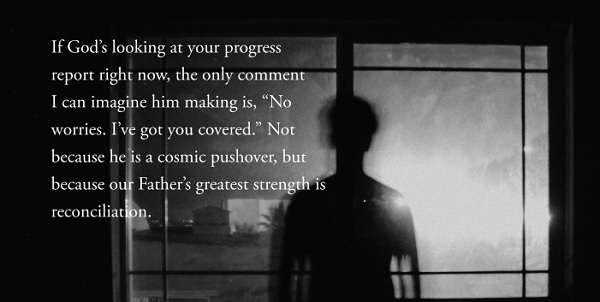No Worries
By Andy Kachel

My high school issued progress reports that arrived in the mail once a quarter. They were printed on plain white paper, folded up, and sealed away in an envelope. I dreaded their arrival more than anything else, even a visit to the dentist. My dad usually intercepted the report before my mom. If my mom was able to pull the report from the mail discreetly, she would tuck it away in her purse until my dad was in a good mood. Rain or shine, the result was always the same. I can remember standing before him in the living room, anxiously running my bare toes against the carpet. He sat comfortably in his Lazy Boy recliner, reading the report to himself and then aloud to me: “English: A, Social Studies: B, Gym: B, Science: C, Algebra: C.” He zeroed in on the Cs and the same question always followed: “Why are you failing?”
This interaction largely shaped my view of God. If God held a progress report of my life at the time, it might have read, “Church attendance: A, Relationships: B, Selfless acts: B, Quality of prayer: C.” Deep down inside I felt like a meeting with God would play out with him zeroing in on my weaknesses and asking, “Why are you failing?”
When I told people as a high-schooler that I decided to start attending church on my own, they seemed impressed. In actuality, church was a safe way to escape the bad emotions at home and be part of something bigger than myself. Maybe it was a way to rebel without doing anything bad. My friend’s grandparents would pick me up in their golden sedan each Sunday morning. My friend stopped going to church shortly after I started, so it was usually just me and their grandparents. They listened to the radio, a baseball game or a church choir, and we made small talk on the ride in. The church people were nice, but much older than me.
Throughout high school I spent more time at church than anywhere else, eventually making friends my own age. It became my home away from home. I remember the sanctuary vividly: the bright morning sun sneaking through the large glass windows. The long pews with their burgundy cushions. The carpeting that made the space feel like one large living room. The pure white walls that rose two stories high, and the fresh clean smell of the sanctuary that gave the impression someone spent a lot of time cleaning every inch to the point of sanitization. There was even a side room in the church for storing the plastic flower arrangements that were set out in the sanctuary and changed each season.

After graduating from high school and moving away to college, I learned my church was full of “politics.” Hearing about the dynamic that existed beneath the surface was like listening to my dad ask, “Why are you failing?” when a “C” is clearly not an “F.” It felt unjust. Each Sunday one of the elders sat in a pew, monitoring his watch to time the service. If any part of the service went over the allotted time, then it was a topic of discussion at the next church meeting. Each of the ladies who sang on Sunday had a designated, colored foam windscreen for her microphone. If the foam windscreen went missing or was misplaced, it might appear that one of the ladies was more important than the others—another topic of discussion at the next church meeting. Every detail was monitored. Every event measured. And all of it was done so that God could have a place to dwell.
Not much has changed in two thousand years, because the same concerns existed when Jesus visited Mary and Martha.
But Martha was distracted by all the preparations that had to be made. She came to him and asked, “Lord, don’t you care that my sister has left me to do the work by myself? Tell her to help me!” “Martha, Martha,” the Lord answered, “You are worried and upset about many things, but few things are needed—or indeed only one. Mary has chosen what is better, and it will not be taken away from her.”1
You don’t have to go far to find the same dynamic occurring in other pockets of society. At church it is termed “legalism,” and in the corporate world it is called “being micromanaged.” We humans struggle to offer one another the benefit of the doubt. We want to avoid messy situations and failure in order to preserve a higher “moral code.” If an oversight occurs, a cost must be paid.
A recurring theme in the Bible seems to suggest the opposite; imperfect actions make things happen. That’s not to say that we should seek to live imperfectly; it’s just that human nature is imperfect. Jesus’s genealogy in Matthew 1 is one big list of imperfection. Abraham lies repeatedly about his relationship to his wife to protect himself,2 Isaac also lies about his relationship to his wife to protect himself,3 and Jacob lies to Isaac to steal Esau’s birthright.4 Further down the genealogy, David sends his servant out to battle knowing he will die, and sleeps with his servant’s wife, Bathsheba.5 Each person on the list would warrant further discussion at a church meeting, and probably more than that. And yet, isn’t it ironic that the bedrock of our religion starts out as a complete mess? In an attempt to monitor every detail to avoid imperfection, we have been lying to ourselves, because everyone falls short at some point and needs reconciliation.
There must be a better way, and Richard Rohr, a Franciscan priest, has a suggestion:
In a Navajo rug there is always an imperfection woven into the corner. And interestingly enough, it’s where “the Spirit moves in and out of the rug.” The pattern is perfect and then there’s one part of it that clearly looks like a mistake . . . Perfection is not the elimination of imperfection. That’s our Western either/or, need-to-control thinking. Perfection, rather, is the ability to incorporate imperfection! There’s no other way to live: You either incorporate imperfection, or you fall into denial. That’s how the Spirit moves in or out of our lives.6

What makes God supreme and all-powerful is his ability to forgive and incorporate our imperfection into his plans. Our human nature is the opposite. Even though we think we view God from a lofty vista of absolute knowing, our view is muddied by our inherent need for a law or a standard. This attitude comes through when we talk about defending God, or at least an idol of God we falsely hold. A year does not go by in this country without the news reporting on a group’s attempt to remove God from the pledge of allegiance; and every Christmas we are told about a “War on Christmas.” Our relationship with God seems to suggest that he is codependent on us to exist. We tell ourselves that if one detail is out of place or removed, God’s image might be tarnished. The real God—the one who exists within and beyond each of us—wouldn’t flinch if everyone started saying “Happy Holidays” instead of “Merry Christmas.”
God has even offered his opinion on this matter in Job Chapters 38 through 40. We do not serve a small, frightened god. Repeatedly, Job is asked questions like, “Who is this that obscures my plans with words without knowledge?”7 And later on, “Can you bind the chains of the Pleiades? Can you loosen Orion’s belt? Can you bring forth the constellations in their seasons or lead out the Bear with its cubs?”8 This questioning goes on for many verses. These chapters could easily be read with the tone of an angry father reviewing his son’s progress report, but it’s quite the opposite. God is saying he has his own personhood and existence apart from our humanity.
To understand God as an almighty and loving Father, we must also understand our position in the relationship. Carl Sagan, the late astrophysicist, might seem like an unlikely source to start looking, but he offers a powerful perspective on the matter. Sagan wrote the following after the spacecraft Voyager 1 snapped a photograph of Earth from the edge of our solar system. The photograph shows the vast grayish-black emptiness of space and a tiny blue pixel. Sagan writes,
Look again at that dot. That’s here. That’s home. That’s us. On it everyone you love, everyone you know, everyone you ever heard of, every human being who ever was, lived out their lives . . . every teacher of morals, every corrupt politician, every “superstar,” every “supreme leader,” every saint and sinner in the history of our species lived there—on a mote of dust suspended in a sunbeam.9
The leaders at my old church monitored every detail, not out of devious intent, but because they truly believed they were making a comfortable place for God to dwell. Had they taken a step back, they would have realized how small they were in the grand scheme of things—merely the size of an atom on “a mote of dust suspended in a sunbeam.” The majesty of God and the small imperfect nature of humankind could be the makings of a horror movie if that was all there was to say. Luckily, we know the rest of the story. The death and resurrection of Christ is the supreme act of mercy that bridges the divide between a powerful God and imperfect humans.

The Father’s love towards us is almost stupefying in his willingness to send his son to rectify our messy situation. And it is his son who is the lynchpin of creation. So very little is said about Jesus’ personality, but if you look hard you can find bits and pieces of it scattered throughout Scripture. For example, in Luke 9:51-55, a Samaritan village is not receptive to Jesus and the brothers James and John ask, “Lord, do you want us to call fire down from heaven to destroy them?” Jesus rebukes them. If you jump to Mark 3:17, you read within the list of Jesus’s apostles, the nickname Jesus gave to the brothers, “Boanerges, which means ‘sons of thunder.’” I like to imagine that some time after the “Samaritan village incident” the Twelve apostles and Jesus were able to look back at the mistake of asking if it was okay to call fire down from heaven and laugh.
Very few things in life are needed. What is necessary is the ability to forgive ourselves, the ability to forgive others, and the willingness to receive forgiveness from God. If God’s looking at your progress report right now, the only comment I can imagine him making is, “No worries. I’ve got you covered.” Not because he is a cosmic pushover, but because our Father’s greatest strength is reconciliation.
References
1 Luke 10:40-42
2 Genesis 12:10-20; 20:1-18
3 Genesis 26:6
4 Genesis 27
5 2 Samuel 11
6 Rohr, Richard. Breathing Under Water: Spirituality and the Twelve Steps. Cincinnati, OH: Franciscan Media, 2011.
7 Job 38:2
8 Job 38:32
9 Sagan, Carl, and Ann Druyan. Pale Blue Dot. S.I.: Ballantine Books, 2011.


 Andy Kachel is a writer and editor in the Boston, Massachusetts area. Outside of work, he enjoys hiking, perusing the local comic book store, spending time with his wife, and reading.
Andy Kachel is a writer and editor in the Boston, Massachusetts area. Outside of work, he enjoys hiking, perusing the local comic book store, spending time with his wife, and reading.